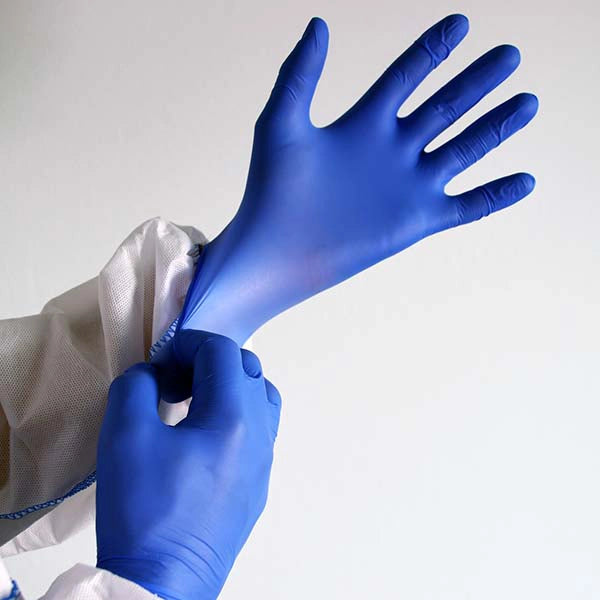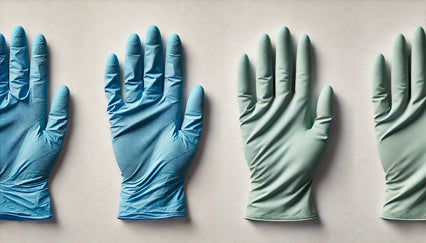Nitrile gloves are a popular choice for various industries due to their durability, chemical resistance, and hypoallergenic properties.
Yes, nitrile gloves do expire. Over time, the materials can degrade, which affects their durability and protective qualities, so it’s essential to check and adhere to the expiry date for safe and effective use.
Understanding the factors that affect the longevity of nitrile gloves and how to properly store them can help you maximize their usefulness and ensure they provide the protection you need.
In this article, we'll explore the expiration of nitrile gloves, how to identify when they've reached the end of their shelf life, and what you can do to extend their lifespan.
Why Do Nitrile Gloves Have An Expiry Date?
Nitrile gloves have an expiry date to ensure they provide optimal protection and functionality when used. Over time, the materials in nitrile gloves can degrade due to exposure to elements such as air, heat, and humidity. This degradation affects the gloves’ integrity, making them more prone to tears, punctures, and reduced barrier effectiveness.
An expired nitrile glove may not provide the necessary level of protection against chemicals, pathogens, or contaminants, which can compromise safety in sensitive environments like healthcare, food handling, and laboratories.
Manufacturers set expiry dates to guarantee that users get the best performance from the gloves within a defined period, helping maintain safety and quality standards. Proper storage—cool, dry, and out of direct sunlight—can help extend the lifespan of nitrile gloves, but it’s always best to adhere to the expiry date for reliable protection.
Factors Affecting Nitrile Glove Shelf Life:
Several factors can impact the longevity of your nitrile gloves, ultimately determining when they expire. Understanding these factors can help you make informed decisions about storage and usage.
Material Composition
Nitrile gloves are made from a synthetic rubber called nitrile butadiene rubber (NBR). This material is known for its durability and resistance to chemicals, but it can still degrade over time. The specific formulation of the NBR used in the gloves can affect their shelf life.
What nitrile is made of plays a role in determining the gloves' overall quality and longevity. Higher-quality nitrile formulations may offer extended shelf life compared to lower-quality alternatives.
Storage Conditions
Proper storage is key to maximizing the shelf life of your nitrile gloves. Ideally, you should store them in a cool, dry, and dark place, away from direct sunlight and moisture.
Exposure to light, especially UV rays, can cause the nitrile material to break down more quickly. Moisture can also lead to the growth of bacteria and mold, compromising the integrity of the gloves.
Extreme temperatures, both hot and cold, can accelerate the degradation process. Storing your gloves in a temperature-controlled environment between 50°F and 90°F (10°C and 32°C) is recommended.
Packaging Integrity
The packaging of your nitrile gloves acts as a barrier against environmental factors that can degrade the material. Intact, unopened packaging helps maintain the gloves' sterility and protects them from exposure to light, moisture, and other contaminants.
Once the packaging is opened, the gloves become more susceptible to degradation. If you don't plan to use the entire box of gloves immediately, consider transferring them to an airtight container to minimize exposure to air and moisture.
Usage and Handling
How you use and handle your nitrile gloves can also impact their lifespan. Regularly exposing the gloves to harsh chemicals or excessive stretching can cause them to deteriorate more quickly.
When donning and removing the gloves, be gentle to avoid tearing or puncturing the material. Avoid contact with sharp objects or abrasive surfaces that could compromise the gloves' integrity.
4 Signs of Expired Nitrile Gloves
Even with proper storage and handling, your nitrile gloves will eventually expire. Knowing how to identify signs of expiration can help you avoid using gloves that no longer provide adequate protection.
1. Visual Inspection
Before using a pair of nitrile gloves, perform a visual inspection. Look for any signs of discoloration, such as yellowing or darkening of the material. These changes in color can indicate that the gloves have begun to degrade.
👉 Read this guide to find out why your gloves are turning yellow
Check for any visible cracks, tears, or punctures in the gloves. These defects can compromise the gloves' barrier protection and increase the risk of exposure to hazardous substances.
Texture Changes
Expired nitrile gloves may exhibit changes in texture. The material may become brittle, stiff, or less elastic over time. These changes can make the gloves more prone to tearing or breaking during use.
If the gloves feel significantly different from when they were new, it's a sign that they may have expired and should be replaced.
Powder Accumulation
Some nitrile gloves are packaged with a powdered coating to make them easier to don. If you notice an excessive accumulation of powder inside the glove box or on the gloves themselves, it could indicate that the gloves have been stored for an extended period and may have expired.
Odor
Expired nitrile gloves may develop an unusual odor. If you notice a strong, unpleasant smell when opening a new box of gloves or while wearing them, it could be a sign that the gloves have degraded and are no longer safe to use.
How to Properly Store Nitrile Gloves
Proper storage of nitrile gloves is key to maximizing their shelf life and ensuring they remain effective when you need them most. Here are some tips to help you store your gloves correctly:
Keep Gloves in Their Original Packaging
The original packaging of nitrile gloves is designed to protect them from environmental factors that can degrade the material. Keeping the gloves in their unopened packaging until you're ready to use them helps maintain their quality and extend their shelf life.
If you've already opened a box of gloves but don't plan to use them all right away, consider transferring the remaining gloves to an airtight container. This will minimize their exposure to air and moisture, which can accelerate the degradation process.
Store in a Cool, Dry, and Dark Place
When choosing a storage location for your nitrile gloves, opt for a cool, dry, and dark place. Avoid areas with direct sunlight, as UV rays can cause the nitrile material to break down more quickly. Exposure to moisture can also lead to the growth of bacteria and mold, compromising the integrity of the gloves.
Aim to store your gloves in a temperature-controlled environment between 50°F and 90°F (10°C and 32°C). Extreme temperatures, both hot and cold, can accelerate the degradation process and shorten the gloves' lifespan.
Follow Manufacturer's Storage Guidelines
Different manufacturers may have specific storage instructions for their nitrile gloves based on the unique formulation of the material. Always check the packaging or consult the manufacturer's website for any additional storage guidelines.
👉 Check out our special selection of Nitrile Gloves and save up to 50% on your order
Some manufacturers may recommend specific temperature ranges, humidity levels, or storage container types to ensure optimal longevity of their gloves. Following these guidelines can help you get the most out of your nitrile gloves and ensure they provide the protection you need when you need it.
Can You Use Expired Nitrile Gloves?
While it's not advisable to use expired nitrile gloves for critical tasks or in settings where sterility is paramount, such as medical procedures or handling hazardous materials, they may still be suitable for certain non-sterile applications.
If you find yourself in a situation where you only have expired gloves available, it's important to inspect them thoroughly for any signs of degradation before using them. Look for brittleness, discoloration, or tears in the material, as these can compromise the gloves' protective qualities and increase the risk of exposure.
Keep in mind that even if expired gloves appear to be in good condition, they may not provide the same level of protection as fresh, unexpired gloves. The material may have weakened over time, making them more susceptible to punctures or chemical permeation.
How to Identify Expired Nitrile Gloves in 3 Steps
Even if you've stored your nitrile gloves properly, they will eventually expire. Knowing how to spot the signs of expiration can help you avoid using gloves that no longer provide adequate protection.
1. Check for an Expiration Date on the Packaging
Some manufacturers include an expiration date on the glove packaging, making it easy for you to determine when it's time to replace your gloves. However, not all manufacturers provide this information, so you may need to rely on other methods to assess the gloves' condition.
2. Look for Signs of Degradation
Expired nitrile gloves often exhibit visible signs of degradation. Discoloration, such as yellowing or darkening of the material, can indicate that the gloves have begun to break down. Brittleness and reduced elasticity are also common signs of expiration, as the nitrile material loses its flexibility and becomes more prone to tearing or breaking.
3. Perform a Visual and Tactile Inspection
Before using a pair of nitrile gloves, take a moment to perform a visual and tactile inspection. Stretch the gloves gently and check for any tears, holes, or other signs of deterioration. If the gloves feel significantly different from when they were new, with changes in texture or elasticity, it's likely that they have expired and should be replaced.
Remember, using expired nitrile gloves can compromise your safety and the effectiveness of the barrier protection they provide. If you have any doubts about the condition of your gloves, it's always better to err on the side of caution and replace them with a fresh pair.
What Are the Risks of Using Expired Nitrile Gloves?
Using expired nitrile gloves comes with several risks that can compromise your safety and the effectiveness of the barrier protection they provide. When gloves degrade over time, their ability to shield you from hazardous substances or pathogens diminishes, increasing the likelihood of exposure.
👉 Check our special selection for Chemical Resistant Gloves and save up to 50% today
Expired gloves are also more susceptible to tears and punctures during use, as the nitrile material loses its strength and elasticity. Even small holes or rips can allow harmful chemicals or biological agents to come into contact with your skin, putting you at risk.
In medical settings, using expired gloves can lead to non-compliance with safety regulations and standards. Healthcare facilities must adhere to strict guidelines for personal protective equipment (PPE) to ensure the safety of both patients and healthcare workers. Using gloves that have passed their expiration date can result in penalties and jeopardize the quality of care provided.
To learn more about the factors that contribute to nitrile glove degradation and how to identify expired gloves, refer to our guide on how to properly store nitrile gloves and our tips for spotting the signs of expiration.
Final Thoughts
gloves.com provides reliable, high-quality nitrile gloves that ensure safety and durability, addressing your need for dependable protection. With a wide selection and expert guidance, you can feel confident knowing your gloves meet the highest standards.
Do Nitrile Gloves Expire: Frequently Asked Questions
Can you use expired nitrile gloves?
It is not recommended to use expired nitrile gloves, as they may no longer provide the necessary level of protection. Expired gloves can become brittle, less elastic, and more prone to tearing or breaking during use. If you have gloves that show signs of expiration, such as discoloration, texture changes, or an unusual odor, it's best to dispose of them and replace them with a fresh pair.
How long do unopened nitrile gloves last?
The shelf life of unopened nitrile gloves can vary depending on the manufacturer and the specific formulation of the nitrile material. On average, unopened nitrile gloves can last between three to five years when stored properly. However, some high-quality nitrile gloves may have a shelf life of up to five years or more. Always check the packaging or consult with the manufacturer for specific information on the expected shelf life of your gloves.
Do black nitrile gloves expire?
Yes, black nitrile gloves, like any other color of nitrile gloves, can expire. The color of the gloves does not impact their shelf life. The same factors that affect the longevity of standard nitrile gloves, such as material composition, storage conditions, and handling practices, also apply to black nitrile gloves. Proper storage and regular inspection for signs of degradation are essential for all nitrile gloves, regardless of their color.





